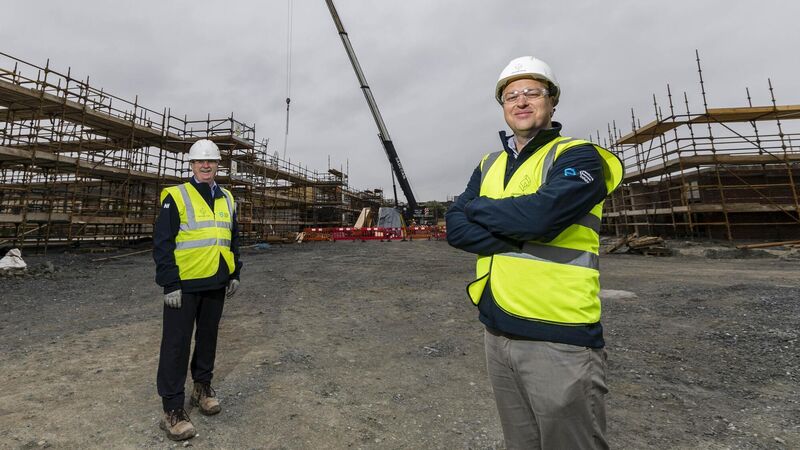Housebuilder Glenveagh says investment fund buyers are needed to boost supply

Glenveagh's head of health and safety Cathal Mooney and CEO Stephen Garvey. The company said it is on course to be building 3,000 houses per year by 2024.
Irish housebuilding company Glenveagh Properties has said that institutional investment funds are necessary buyers in the housing market and supply would be further restricted without them.
However, it stressed that only a “very small proportion” of its current house order book is earmarked to go to vulture fund buyers, with the vast bulk directly targeted at the owner-occupier market.
Speaking after the company’s AGM, Glenveagh chief executive Stephen Garvey said the market needs institutional investors to fund big housing schemes — particularly large apartment developments — and warned stopping them fully could lock further housing supply out of the system.
Mr Garvey said the industry did “phenomenally well” to build 20,000 houses last year during the pandemic restrictions.
He said closing the gap between supply and demand — and getting closer to the 35,000 to 40,000 new builds per year necessary — is possible in the long-term.
However, he said that depends on things like improving access to credit for buyers, the success of the shared equity scheme, and improving planning regulations.
Mr Garvey said improved supply could also have a stabilising effect on house prices.
Glenveagh has started building work on three suburban sites, which will start delivering houses from 2022.
But, the company said since building restrictions were lifted last month it has seen a 5% rise in construction tender prices and a jump in raw material costs, which it said will impact on deliveries from next year.
Glenveagh said it has available funds of €230m.
The company has already spent around €48m, so far this year, adding to its land bank with the acquisition of eight new sites.
Between them, these can deliver more than 1,900 new houses.
Glenveagh is also starting a €75m share buyback programme having identified that much in excess capital.
It said it will consider the return of excess capital to shareholders in a manner which retains flexibility to capitalise on future growth opportunities.
Meanwhile, the company said that current executive chairman — and former Nama executive — John Mulcahy will move to the role of non-executive chairman at the start of next year.











